'Philosopher Sartre. Women swooned.’- it was the caption of a photo of the “Time Magazine” published in 1945. The photograph was of 28th October of the very same year when Sartre had a public talk for the Club Maintenant (the ‘Now Club’) at the Salle des Centraux, Paris. The crowd went mad to attend the lecture on philosophy by Sartre. Sartre’s lectures on that day were later turned into a book : “L’existentialisme est un humanisme”, which, later was translated as “Existentialism and Humanism”(2).
There are some critics who claim existentialism to be the effect of the wars(3). But again Simone de Beauvoir declines this theory and writes, “It is not a social phenomenon, nor a political movement, nor a postwar fashion, even though it has social repercussions, it does include political implications, and fashion has both served and dis-served it.”
Before going through these theories and their counters, it is so crucial to learn the story behind the birth of modern existentialism in the soil of France from the philosophical maskets of ‘phenomenology’. Simone de Beauvoir, from whom we learn most of the early days’ story of existentialism, said that the first wave tsunami of existentialism hit them during 1932-33 when de Beauvoir and her boyfriend Jean-Paul Sartre, a student of philosophy and a professor in Le Harve, were sitting in the Bec-de-Gaz bar on the rue du Montparnasse in Paris with their mutual friend Raymond Aron with the special drink apricot cocktails.
Raymond Aron was a student from Berlin who brought a new philosophical dish to France and served in front of Simone de Beauvoir and Jean-Paul Sartre with apricot cocktails. That special dish was ‘phenomenology’. The term ‘phenomenology’ derives from the ideas of the German philosopher Edmund Husserl. The German phenomenologists used to go straight moment to moment as per their experience in life, unlike the ancient or traditional philosophers who often started with abstract axioms or theories. The phenomenologists chose to concentrate on the encounter with ‘phenomena’(4) ignoring the rest, even the Platonic puzzles like the reality of the ‘thing’. The phenomenologists propose to deal with more down-to-earth matters bracketing all the philosophical old puzzles.
Edmund Husserl; Archiv für Kunst und Geschichte, Berlin
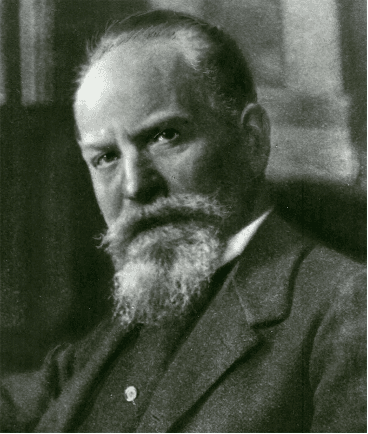
Edmund Husserl; Archiv für Kunst und Geschichte, Berlin
Following Husserl we find ‘To the things themselves!’ which instructs neither to waste time on the interpretations that accrue upon things, nor to waste time wondering its reality; but to look at this that is presenting itself.
Martin Heidegger, on the other hand, points out to focus on the primary as well as the most important question- the question on Being. What is it for a thing to be? What is the meaning in saying that one oneself is?
His recommended phenomenological method was to disregard intellectual clutter, paying attention to the things and to let them reveal themselves.
These aspects of German ‘phenomenology’ were told to Sartre by his friend Aron and moved Sartre so much that he turned himself from a philosopher with no idea about phenomenology to one of the pioneers of existentialism. According to Simone de Beauvoir, they felt interested in the interest of phenomenology which was a way of practicing philosophy that reconnected it with daily life experiences.
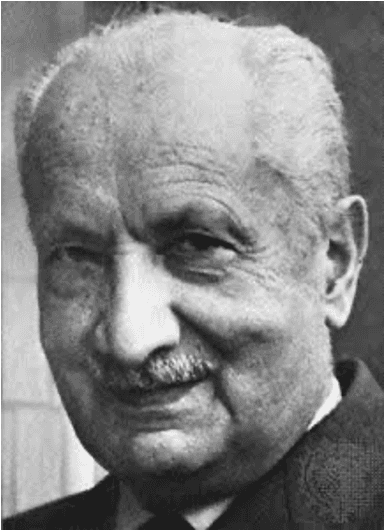
Martin Heidegger; Camera Press/Globe Photo
If we go a little more backward, we’ll find another name- Soren Kierkegaard (1813-55), whose thinkings are commonly considered to be the primary pillar of this philosophical concept- existentialism. In his works like- “Fear and Trembling” (1843), “The Concept of Dread” (1844), “Sickness Unto Death” (1848), we find Kierkegaard to elaborate upon the belief that through God and in God man may find freedom from tension and discontent and therefore find peace of mind and spiritual serenity. Basically it was an idea which had prevailed by much Christian thinking over many centuries. Through his writings Kierkegaard brought the modern Christian existentialism in the earth and philosophy.
The above-mentioned philosophers, like- Heidegger, Jaspers and some others were greatly moved by this modern Christian existentialist philosophy of Kierkegaard.
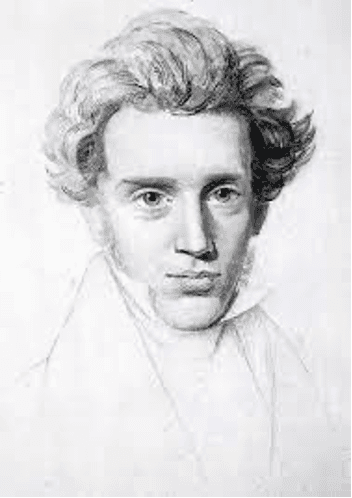
Søren Kierkegaard, drawing by Christian Kierkegaard, c. 1840; in a private collection.
Let’s put these critical background things aside, and put the focus on the term ‘existentialism’ again. What is it? What is the essence of existentialism? Why is it existentialism? How is it?
The term ‘existentialism’ was first coined by Gabriel Marcel in the mid-1940s. This French catholic philosopher, in 1945, at a colloquium, applied this term to Jean-Paul Sartre and introduced him to be a existentialist philosopher. But we come to know that Sartre denied it and did not agree to be known as a philosopher of ‘existentialism’. Sartre had enough doubts about the advisability of using the term ‘existentialism’. He preferred to speak of ‘philosophy of existence’, though later, due to popular pressure, he was forced to adopt the more popular term : ‘EXISTENTIALISM’.
We find Heigegger too, in the ‘Letter on “Humanism”’ (1946), addressed to his French translator Jean Beaufret, to be careful to distance himself from Sartre. He objects to ‘DASEIN’ being translated as ‘realite humaine’ (‘human reality’) and places ‘existentialism’ in disdainful inverted commas.
If we come to Sartre’s philosophy on the ‘philosophy on existence’, we find it to stem from the in-itself/for-itself distinction and from the insistence on human freedom. According to Sartre, freedom is a free power to every individual. Freedom means that individuals have no destiny, and are obliged to choose freely what they become. Sartre quotes, “Existence precedes essence.”(5) which means humans take birth to prove their existence and later decide their essence. To elaborate, a bottle is made keeping its job in mind. It is made to contain any liquid thing in general. For a bottle, its essence came before its existence. But for humans, it’s not possible as we come to the earth from our mother’s womb first and later with our interest and capabilities decide our essence. Of course the social, political, geographical as well as genetic things matter to create marks on the diversity of human essence, but from the core it is the individuals who are responsible for their essence.
Being influenced by this theory, Simone de Beauvoir also used this concept in her feminist existentialism to develop the idea that- “One is not born a woman, but becomes one.”(6)
Sartre used to believe that there is no sense of such words like ‘cannot’, ‘must’. These words are basically absurd.
According to Sartre’s philosophy, “I can always choose, but I must know that if I do not choose, that is still a choice.”(7)
It is a bold, revolutionary approach. To elaborate, a child in society, in general, is given father’s religion as its own. The child is not given the freedom to choose its own interest, own religious philosophy. It is forcefully given. It should depend on the children to choose their religion, atheism or nothing. Choosing nothingness is too a choice for the individuals.
Simone de Beauvoir and Jean-Paul Sartre attended the ceremony of 6th Anniversary of Founding of Communist China in Beijing on 1 October 1955, in Tiananmen Square.
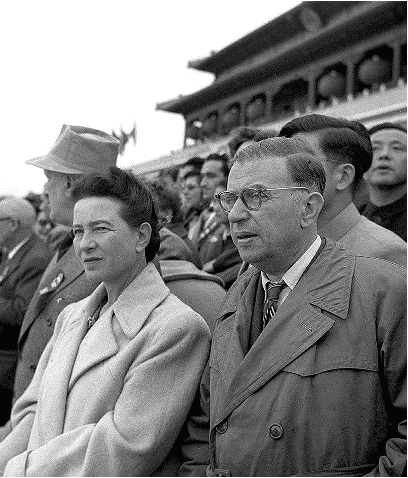
Simone de Beauvoir and Jean-Paul Sartre attended the ceremony of 6th Anniversary of Founding of Communist China in Beijing on 1 October 1955, in Tiananmen Square.
If we look at Sartre’s novel “Nausea”, published in 1938, we can find that “Nausea” refers to such a disgusting feeling that is induced in the narrator by the sight of a chestnut tree in a park. That tree shows the stark physicality and the meaninglessness of existence by being there. It also declares the fundamental difference between the existence of things and of human beings. In “Nausea”, we find the chestnut tree to be always identical to itself; but for human beings, they exist both in themselves and for themselves, unlike the chestnut tree that exists IN-ITSELF. Human beings are free because they project themselves into a future existence by negating what they are and exist for themselves(8). In “Nausea”, we find many of the themes which are present in Sartre’s “Being and Nothingness” (published in 1943), to be anticipated.
The Sartrean philosophy of existence is an individualist philosophy at its core. Many critics have put critical comments on his philosophy because of its ‘Solipsism’(9) . We find Sartrean philosophy to reduce the subject to the dimensions of being-for-others.
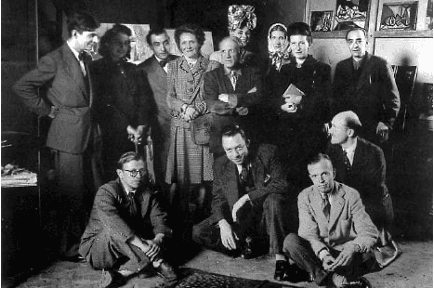
Top row (left to right): Jacques Lacan, Cecile Eluard, Pierre Reverdy, Louis Leiris, Pablo Picasso, Fanie de Campan, Valentine Hugo, Simone de Beauvoir, Brassai. T, Bottom row: Jean-Paul Sartre, Albert Camus, Michel Leiris, Jean Abier - photo: Gilberte Brassai
Conclusion
In existentialism, we often find the theme of ‘absurdity’ to be highly involved. It was a popular perception that there was a close link between existentialism and the theory of absurdity associated with Albert Camus, even though that theory has none of Sartre’s rigour.
Some often declare existentialism as an extract of Marxist philosophy. But it we follow Simone de Beauvoir, she quotes:
“Pascal summarized the ambiguity of the relationship between the Universe and man in a famous and striking expression when he called man a thinking reed. From this definition, Christianity retains essentially the aspect of interiority: in the secret of his heart, by the purity of his intentions, and by the individual accomplishment of the ethics dictated by his conscience, man will attain his salvation in this world. On the contrary, Marxism emphasizes that man is a reed, a thing among things, definable by his relationship with the objective reality of the world.
Existentialism strives to hold both ends of the chain at the same time, surpassing [dépassant] the interior-exterior, subjective-objective opposition.”

Mrira Nath Chakraborty
Co-Founding Dreamer & Chief Strategic Advisor, OBS Press LLC
Footnotes
“Many criticisms addressed to us by uninformed minds are aimed at Descartes or Kant rather than existentialism. It is very often philosophy in general that is being questioned by attacking us. In truth, several years of study are needed to be able to detect existentialism’s original contributions to philosophy and to be in a position to discuss the validity of it.”- Simone de Beauvoir.
Existentialism and Humanism”- translated & introduced by PHILIP MAIRET; Methun: London.
Primarily World War I & World War II.
Greek word with the meaning ‘things that appear’
Originated from Sartre’s 1946 lecture “Existentialism Is a Humanism”
“The Second Sex”, Simone de Beauvoir
“Existentialism Is a Humanism”
Cited from “The Penguin Dictionary of Critical Theory”, edited by David Macey.
‘Solipsism’ is the philosophical idea that only one's mind is sure to exist. As an epistemological position, solipsism holds that knowledge of anything outside one's own mind is unsure; the external world and other minds cannot be known and might not exist outside the mind.
References
1. AT THE EXISTENTIALIST CAFE, Sarah Bakewell
2. THE PENGUIN DICTIONARY OF LITERARY TERMS & LITERARY THEORY, edited by J. A. Cuddon
3. THE PENGUIN DICTIONARY OF CRITICAL THEORY, edited by David Macey
4. “WHAT IS EXISTENTIALISM”, Simone de Beauvoir
5. EXISTENTIALISM AND MODERN LITERATURE, D. McElroy
6. EXISTENTIALISM IS A HUMANISM, Jean-Paul Sartre
7. NAUSEA, Jean-Paul Sartre
8. BEING AND NOTHINGNESS, Jean-Paul Sartre





